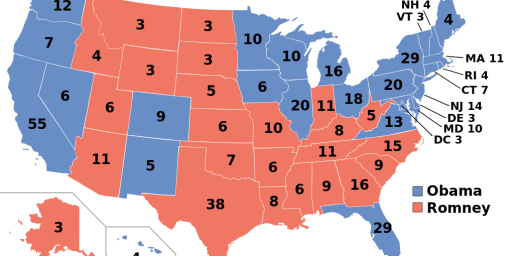Mea Culpa on the Electoral College – Steven Taylor Edition
In the past, I’ve disagreed with Steven Taylor on the merits of the electoral college. One of his most recent posts on it is here. I was wrong. The thing that made me reconsider is the fact that Romney would have won under my previously preferred option, having states allocate their electoral vote like Maine and Nebraska, by congressional district with the state winner winning the the two votes of the state provided by Senators.
I was wrong, and not just because Romney would have won under my previous preference. I had never considered the effect of gerrymandering.
So, there you go. I’m still not sold on a national popular vote, but my earlier preference was wrong.






Did someone amend the rules about changing your mind on the internet? That’s legal now?
I’ve been wrong on more occasions than I care to admit.
I ask this for discussion, not as an advocate of the position (yet), but isn’t anything except a national popular vote inherently problematic? More to the point, it seems like any system that potentially yields a winner other than the popular vote winner isn’t reflective of the will of the people.
Or maybe I should ask it this way: why would we want someone other than the person who wins the popular vote?
@Boyd: Perhaps, but I’m still, perhaps unreasonably, wedded to the idea that voting is co-mingled to our form of government.
Robert,
Better to be boldy wrong thatn timidly safe. My hat’s off to you for
(1) expressing a reasoned opinion, and
(2) updating that opinion when the facts warrant.
This is the very definition of intellectual maturity.
@Boyd:
Like it or not, ours is a federal system.
So, constitutionally, the president must be done state by state, like driver’s licenses.
One flaw with a presidential popular vote overlain a federal system is that each state has an incentive to inflate it’s vote count by whatever means possible. That could be good or bad, but would almost certainly be bad for the current configuration of the Republican party.
That said, as a California voter I like a presidential popular vote WAY better than the current system.
@Robert: I appreciate the post and the sentiment. And thanks for noting what the outcome would have been this year–I hadn’t gotten around to thinking about it yet, but I have tried to make the gerrymandering point a couple of times.
@Tylerh: There is no inherent reason why a federal system has to have different voting systems for president at the state level. The constitution can be changed to alter the way the president is elected and still have federalism.
Mexico, Brazil, and Argentina are all federal countries with popularly elected presidents.
@Boyd:
Indeed.
@ Robert
Always nice to see some intellectual honesty on display. Don’t suppose you could teach Doug those three simple words… “I was wrong”…
@Steven L. Taylor:
Brazil is “Federative” mostly on name. The 1988 Federal Constitution tries to establish duties and rights for States, cities and the Federal Government, but there are clear limitations for the role of states. There is a uniform Penal Law for all the country, there is also a uniform Electoral Law. States also have restrictions about Tax Laws. Ironically, the one place that´s really Federative is red tape: if you are opening a business you have to deal with endless bureaucratic requirements at State, City and Federal Level.
(Brazil is a bizarre federation because it´s a federation created by force. In the 1800´s, it was necessary to bring European Mercenaries to fight rebellions in a dozen of states).
On one hand, it´s good that there is no 26 ages of consent and because states have clear limits on their ability of passing stupid legislation. On the other hand, I think that states have their own problems and they should have more power to deal with them.
As far as I remember Mexico and Argentina are also not strictly Federations, because the Federal Government is relatively powerful. That´s a much more weaker federalism than the Anglo-Saxon version of Federalism.
@Andre Kenji: I think that you are using a very narrow definition of federalism. I think you will find that an awful lot of experts consider all of these cases federal.
Indeed, I think you are almost defining federalism as more a confederation.
@Andre Kenji: Here’s a rather good book on the subject: Federalism and Democracy in Latin America. I would also, in general, recommend the work of Alfred Stepan, who is a noted expert on Brazil, and who has done a lot of really good work in the last decade or so on federalism.
Here’s a short piece online: Federalism and Democracy:
Beyond the U.S. Model
@Robert: For what it is worth my progression of thought on this topic went something like this:
1. The electoral college is keen because it was created by the Framers and is a unique institution well-suited to the US system. (I felt this way even post-Florida 2000).
2. The EC would be better if we allocated all the EVs by congressional districts (I started thinking this in the early 2000s).
3. Maybe we should go the popular vote
(the last couple of years):
4. The popular actually makes some serious sense. Swing states should not get that much attention.
5. The EC is a mess that makes no sense and no one who was designing a system scratch would even consider such system.
6. WTF?! The thing doesn’t even work the way the Framers thought it would (so there are zero design/intent arguments to be had). We really, really need to replace the stupid thing. Why shouldn’t the one office that represents the whole nation not be elected by the whole electorate?
@Steven L. Taylor: Yes, I´m using a very narrow definition of Federalism. The Anglo-Saxon idea of Federalism is very different from the idea of Federalism in countries with Neo-Latin Languages. In Mexico, Brazil and Argentina the states, cities and the federal government are supposed to have equivalent power while in the former British colonies States are supposed to be more powerful than the Federal government.
Considering the subject of the post, all of these three countries have special organizations from the Judiciary to run elections. It would be interesting to see John Roberts and Antonin Scalia organizing the Federal Elections in the United States. .-)
@Andre Kenji: I would submit you are using an overly narrow definition, but I expect that we will continue to disagree 🙂
@Steven L. Taylor: I don´t think that we disagree. The nature of Federalism in America is very different from Federalism in Latin America. And you are right, specially if we consider that China, an authoritarian country, is a Federation.
@Andre Kenji: But I think that we do. I think that Argentina, Brazil, and Mexico are federal cases that can be discussed in a comparative sense with the US (along with other cases, including Canada, Belgium Switzerland, and India).
Steven,
I apparently have an idiot’s disease, but I’m still liking the electoral college. It’s mostly due to a George Will *puke* column from several years ago that said it provided a mandate to the winner. For instance, if a president wins with 51% of the popular vote and 60% of the EV, he has a mandate. Of course, Republican’s disagree with this now.
@Robert Prather: Yes, but what’s a “mandate” anyway? The basic outcome is dichotomous: win or lose. The margin of victory really doesn’t mean much of anything if the Congress is held part, or in all, by the opposition.
@Steven L. Taylor: I agree, but I dislike the back door attempt to modify the voting process. I’m torn, because in a perfect world, we would pass an amendment that enshrined the popular vote. States won’t go for this, but still…..
@Robert Prather: That would be my preference. I am ambivalent on the NPV initiative, although I suppose I am far more pro than con.
I think that if we had a real public discussion on this topic we might get the amendment process.
@Tylerh: I have nothing to say, other than thank you.